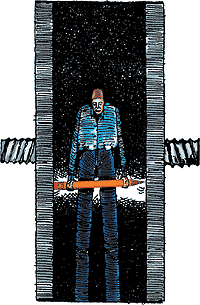 We must have elections, but we can't have elections. That is the dilemma of our democracy.
We must have elections, but we can't have elections. That is the dilemma of our democracy. Who gets the tree symbol is not really that important. What is more critical is what happens if elections can\'t be held as scheduled. Now that he has brought us so far, it is up to Prime Minister Sher Bahadur Deuba to show that he can hold credible polls and guarantee free and normal campaigning. For this, he needs to lift the state of emergency two weeks from now. But he can't do that until he has a truce with the Maoists. The Maoists are offering to talk, but once-bitten Deuba is twice shy. And he's under pressure from his hardline mentors not to buckle. It is a precarious time to be prime minister.
The Maoists are also in a fix. Despite threats about disrupting the campaign, a scuttled election and the ensuing constitutional crisis will not be to their strategic advantage. The Maoists have now realised that their fast-forward revolution went out of control and resurrected the ultra-right. This wasn't how it was supposed to happen, it was supposed to be an easy victory over a corrupt and fractious bunch of reactionary puppets.
In their plenum the Maoist leadership decided to call off their "decisive forward leap" and concentrate on long-term political work. For this they need public opinion on their side and they can't afford to antagonise other political forces. The leadership will therefore need to keep up its hardline rhetoric in public, mostly to assuage the rank and file who worry that they might have sold out. But having broken the truce once, the onus is on the Maoists to prove their good faith this time. And to egg them along in that direction, there is military and political pressure.
Escalating the violence and provoking the government to call off elections will force a constitutional crisis, requiring the king to use the provisions of Article 127 of the constitution to "remove obstacles that prevent the enforcement of constitutional provisions". The king is entitled to give executive orders to parliament to overcome the crisis. But what if there is no parliament, like now? The constitutional monarch has a slew of options, and if it comes to Article 127, the motivation for any move he makes will be to get the country back
on track.

For the moment, going by the past record, the only thing we can be absolutely sure about is that even if elections are held, and even if they are relatively fair, the old familiar faces will be back. However, it can't be politics as usual. The country cannot-will not-endure another 12 years of this.


